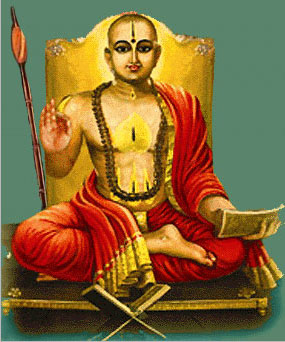
Madhvacharya (1238 - 1317)
The Dvaita or "dualist" school of Hindu Vedanta philosophy originated in 13th-century South India with Sri Madhvacarya (Madhva). Madhva, who considered himself an avatara of the wind-god Vayu, argued that a body of canonical texts called the "Vedanta" or "end of the Veda" taught the fundamental difference between the individual self or atman and the ultimate reality, brahman. According to Madhva there are two orders of reality:
1. svatantra, independent reality, which consists of Brahman alone.
2. paratantra, dependent reality, which consists of jivas (souls) and jada (lifeless objects).
Although dependent reality would not exist apart from brahman's will, this very dependence creates a fundamental distinction between brahman and all else, implying a dualist view.
By interpreting the Vedanta materials (especially the Upanisads, the Bhagavadgita and the Brahmasutras) along these lines, Madhva deliberately challenged the non-dualist reading in which the atman was identified with brahman. Madhva argued that the scriptures could not teach the identity of all beings because this would contradict ordinary perception, which tells us that we are different both from one another and from God. Madhva and his followers call their system tattvavada, "the realist viewpoint".
Back to Philosophy